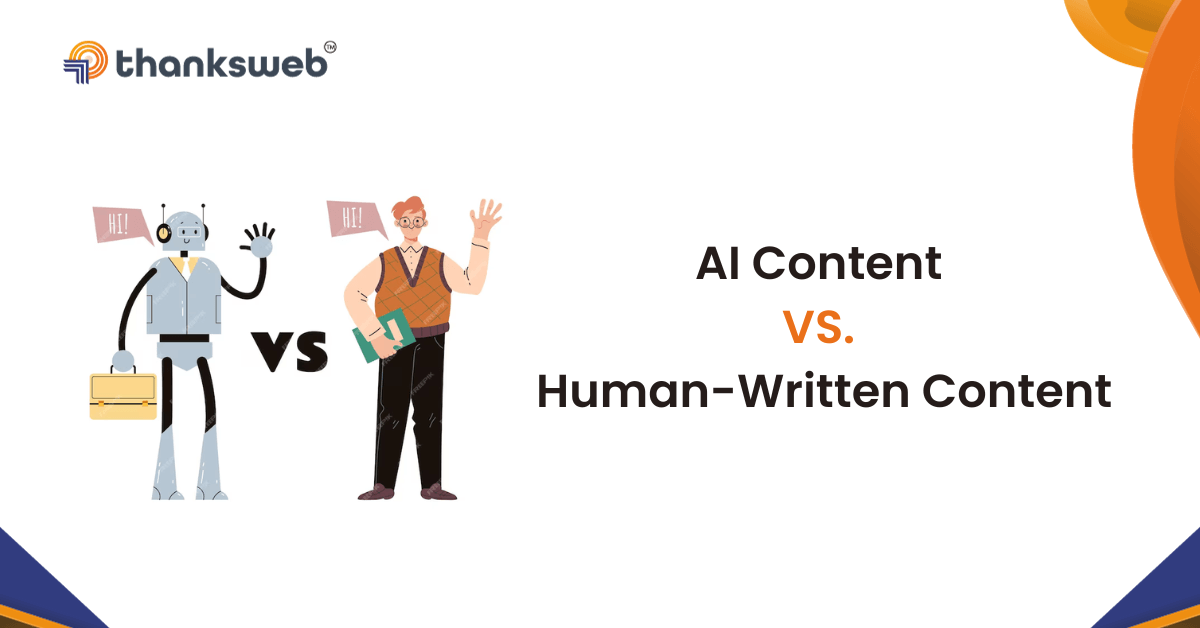Gone are the days when humans exclusively crafted all written content! Today, AI algorithms have stepped in, promising efficiency and productivity. Is there a threat to the content industry in the future? Will we see a tussle between AI and human content writers? Let’s find out!
What is AI-generated content?
Intelligent (AI) tools create content, which is known as AI-generated content. These AI models can comprehend, interpret, and generate text based on user input like keywords, templates, human-readable queries, or prompts that bear a resemblance to writing.
AI-generated content comes into play for automating writing tasks and content creation processes and enabling personalized content generation at scale.
The Use of AI in Content Creation
- AI has smartly made its mark in content creation, revolutionizing how we produce content. With the help of algorithms and machine learning, AI can now generate articles, blog posts, product descriptions, and even social media captions.
- One significant advantage of incorporating AI into content creation is its speed. While it may take a human writer an hour to craft an article, AI can produce pieces within minutes. Furthermore, AI eliminates the risk of typos or grammatical mistakes.
- However, it’s important to acknowledge that, while AI can deliver results quickly and consistently adhere to established guidelines, there are limitations when it comes to creativity and nuance.
- Exceptional writing is about tapping into emotions and creating connections with readers. This aspect is deeply rooted in the craft of content writers. While AI technology certainly has advantages in terms of efficiency and consistency, it should be viewed as a tool that complements and replaces the human touch.
Read also: Best AI Copywriting Tools
Advantages of AI Content
The use of artificial intelligence (AI) in content creation has gained popularity. It’s not surprising considering its advantages, which can revolutionize how we create and consume content.
- One significant benefit of artificial intelligence is that it produces text much more quickly than human authors do. As a result, artificial intelligence has become a potent instrument for scaling up the production of content and has the potential to be a godsend for any company that is interested in increasing the rate at which it publishes information online.
- Another key advantage of AI-generated content is its speed and efficiency. Thanks to algorithms that process large amounts of data within seconds, AI can generate articles or blog posts much faster than human writers. This enables businesses to publish a volume of content at a pace that meets the growing demand for fresh and relevant information.
- The consistency of style and tone that AI-generated content has is another advantage. Unlike humans, who may have different writing styles or tones, AI ensures a voice across all platforms and channels. This consistency proves valuable for brands aiming to maintain their brand identity.
- By examining the data on how users behave, their preferences, and demographics at a level, AI algorithms can customize recommendations for each user. This personalized approach does not improve user satisfaction. It also boosts conversion rates.
- Furthermore, the use of intelligence in creation introduces exciting prospects for creativity. For example, there are developments in AI that generate poetry or even create artwork using deep learning techniques inspired by established works by celebrated artists.
Can Google detect AI content?
Google’s algorithms prioritize original, high-quality material. AI-generated content that gives useful information to users may not be penalized. Search rankings may drop if the content is spammy, incoherent, or violates Google’s criteria.
Search engine algorithms change, and Google may tweak its algorithms to understand and rate various materials. Staying abreast of Google’s content regulations and guidelines can affect how AI-generated material appears in search results.
You can also read: Is AI content against Google Webmaster Guidelines?
In Conclusion
Speed, efficiency, consistency, insights, personalized experiences, and greater creativity are all benefits of AI-generated content, which will shape digital communication. Despite its limits, this technology can improve content development in numerous ways.
AI-powered content enables organizations to produce enormous amounts of material quickly and efficiently. It can also automate monotonous chores to free up authors to create. AI may also analyze data and user behaviour to create audience-targeted content.

